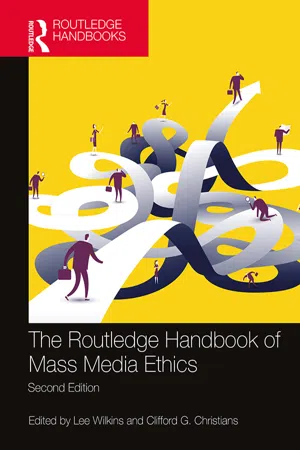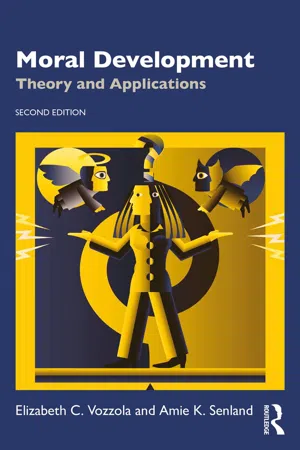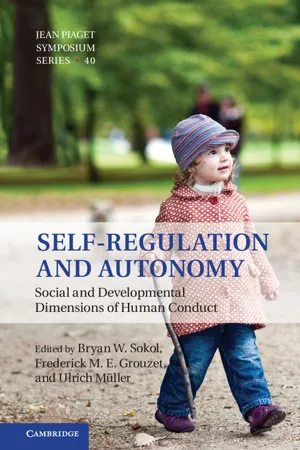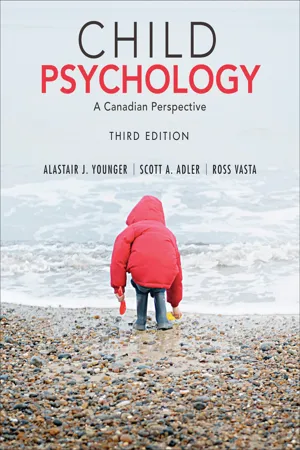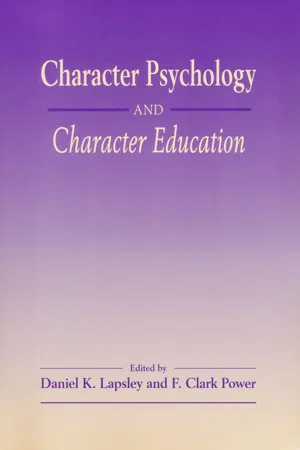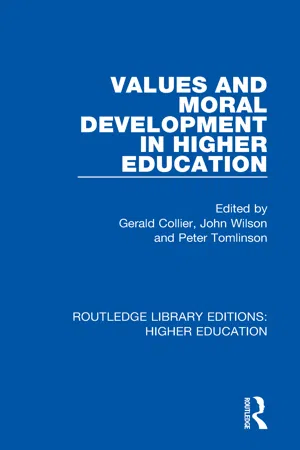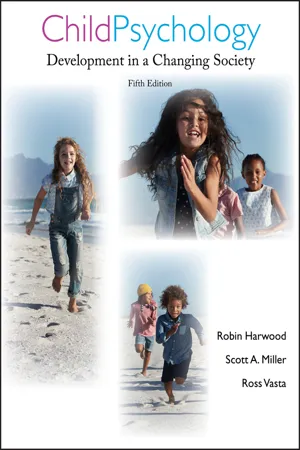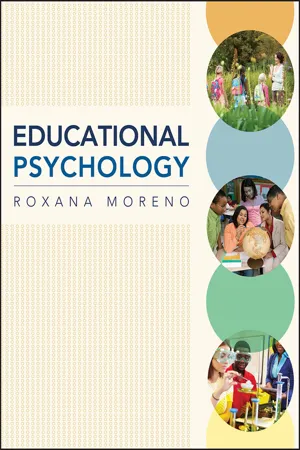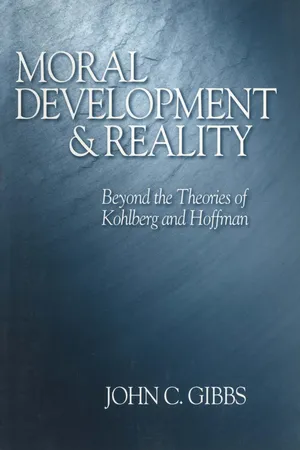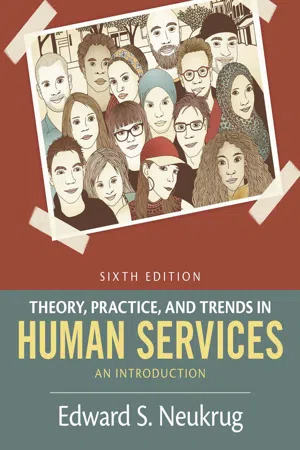Psychology
Moral Development
Moral development refers to the process through which individuals acquire their understanding of right and wrong, as well as their ability to make ethical decisions. This concept, often associated with the work of psychologist Lawrence Kohlberg, involves the progression from basic obedience to a more complex understanding of universal ethical principles. It encompasses the cognitive, emotional, and social factors that shape an individual's moral reasoning and behavior.
Written by Perlego with AI-assistance
Related key terms
1 of 5
10 Key excerpts on "Moral Development"
- eBook - ePub
- Lee Wilkins, Clifford G. Christians, Lee Wilkins, Clifford G. Christians(Authors)
- 2020(Publication Date)
- Routledge(Publisher)
4Moral Development
A Psychological Approach to Understanding Moral Decision Making
Renita Coleman and Lee WilkinsIntroduction
Research on Moral Development attempts to respond to the following question: how is it that people grow morally, and what influences the development of a moral life? Moral Development research makes some important assumptions that are seldom addressed in the literature but which are nonetheless central to it:- All human beings have the capacity for moral thinking.
- Moral thinking is linked to experience. While philosophers have contributed enormously to a thoroughgoing analysis of the implications of choice within experience, no legitimate ethical theory divorces human action, and hence experience, from moral thinking, learning and growth.
- Moral thinking can be both general and particular. There are general moral questions—is it right to lie or to kill—to which all human beings have a response. But, there are particular elaborations of moral questions—is it ever appropriate for a journalist to deceive a source who is attempting to deceive the journalist—to which professionals must respond within a particular context.
Theoretical Building Blocks
The Swiss psychologist Jean Piaget is considered the field’s founder in terms of both research results and approach. Piaget was particularly interested in how children put their cognitive worlds in order. He researched and wrote the book The Moral Judgment of the Child - eBook - ePub
Moral Development
Theory and Applications
- Elizabeth C. Vozzola, Amie K. Senland(Authors)
- 2022(Publication Date)
- Routledge(Publisher)
Moral Development in the 21st Century: Theoretical Roots and New DirectionsPassage contains an image
1 Introduction
DOI: 10.4324/9780429295461-2Humans have been pondering questions of morality for as long as we have records of their queries. Meno asks Socrates, “Can you tell me, Socrates, whether virtue is acquired by teaching or by practice;… [or] whether it comes to man by nature, or in what other way?” (Plato, 380 BCE). In the relatively recent field of psychology, cognitive developmentalists have developed one set of answers, and thinkers from behavioral, psychoanalytic, social learning, and evolutionary perspectives yet others.A second edition of this text was important because of the current paradigm shift of theory and research within the field. The earlier dominant constructionist paradigm has been challenged, and some believe, replaced, by theories from evolutionary, biological, personality, and cultural psychology. Many researchers no longer hold to classic universal theories and stress the need to look at morality through specific cultural lenses.For the purposes of this book, we use the term morality in the general language usage of principles of right and wrong actions and judgments. This book looks at a special area of morality, the field of Moral Development, in two ways: (1) changes across time and experience in how people understand right and wrong; as well as (2) individual differences in moral judgments, emotions, and actions. Some perspectives stress that principles of moral conduct are set by society, others that they are actively constructed by the developing child, and still others that there is a significant biological underpinning to our moral judgments, emotions, and behavior.Part I of this book explores not only the classic theories upon which the modern field of Moral Development rests, but also newer theories and directions that are rarely covered in traditional developmental textbooks. In Chapter 2 - eBook - PDF
Self-Regulation and Autonomy
Social and Developmental Dimensions of Human Conduct
- Bryan W. Sokol, Frederick M. E. Grouzet, Ulrich Müller(Authors)
- 2013(Publication Date)
- Cambridge University Press(Publisher)
Moreover, it is evident that a core concept of Kohlberg’s theory, the idea of development as transformative change, plays at best a peripheral role in this theoretical context. Whereas in the 1970s and 1980s, developmental psychology was leading research on moral reasoning and action, this leadership status has been transferred to biology, neuroscience, and related disciplines. The new synthesis of moral psychology (Haidt, 2007) is not without dissenters. Strong and thought-provoking arguments have been raised Chapter 6 Revisiting the Moral Self-Construct: Developmental Perspectives on Moral Selood Tobias Krettenauer Wilfrid Laurier University -rettenauer 116 against a reductionistist understanding of morality (cf. Carpendale, Sokol, & Müller, 2010; Smetana & Killen, 2008). This chapter is not meant to repeat these arguments nor does it intend to discuss the three volumes that rep- resent the new synthesis of moral psychology (for reviews, see Buchanan, 2008; Hammond, 2008; Wereha & Racine, 2008). Rather, it aims at high- lighting one particular aspect of individual Moral Development that easily falls through the grid of current cognitive-neuro-biological theorizing: The fact that morality is intimately tied to individuals’ sense of self. If moral actions were exclusively based on impersonal cognitive heuristics, evolu- tionary adaptations, or brain processes without any involvement of an agen- tic self, they would lack an important feature that renders moral actions truly moral: the fact that these actions are “ours.” 1 People “own” their moral actions and therefore feel responsible for them. Without a self, moral emo- tions of guilt, shame, and pride would not exist (e.g., Tracy & Robins, 2007). Morality is imbued with selood (see also Frankfurt, 1988; Taylor, 1985). - eBook - PDF
Child Psychology
A Canadian Perspective
- Alastair Younger, Scott A. Adler, Ross Vasta(Authors)
- 2014(Publication Date)
- Wiley(Publisher)
Research on affect focuses on the emotions associated with moral behaviour, such as empathy and guilt. Research into the cognitive underpinnings of Moral Development investigates how children think about what they and others do. Studies of this type focus on children’s ability to examine a situation and decide whether a person’s behaviour was appropriate, and whether the person should be punished. Ultimately, of course, researchers aim to explain children’s behaviour—for example, why children steal, which children are more likely to start fights, and what factors promote sharing and cooperation among youngsters. Increasingly, models of Moral Development incorporate all three facets. Historically, however, each of these facets has been studied in isolation. This is due, in part, to the ways in which the four major approaches to development have conceptualized Moral Development. THEORIES OF Moral Development Two theoretical issues have dominated the study of Moral Development. One is whether children’s moral beliefs and behaviours reside in the child and simply emerge over time, or whether they reside in the culture and are transmitted to the child. The second issue involves the generality of moral rules. If they emerge from the child, they must have a large biological component, making them universal for all members of our species. On the other hand, if they develop within the social group, they are more arbitrary and thus can vary from one culture to the next. These two questions lie at the heart of much of the research on this topic. COGNITIVE-DEVELOPMENTAL APPROACHES The cognitive tradition has been most concerned with the development of children’s moral reason- ing as they struggle with issues involving moral rules and social conventions. Some of these issues, such as physician-assisted suicide or the death penalty, are complex, with compelling arguments on both sides. - eBook - PDF
- Daniel K. Lapsley, F. Clark Power, Daniel K. Lapsley, F. Clark Power(Authors)
- 2021(Publication Date)
- University of Notre Dame Press(Publisher)
As a result the study of Moral Development is now largely marginalized within the broader context of cognitive and social developmental research. The debates and issues that once swirled around the moral stage theory, and that once provided an exciting momentum to research, now hold little interest, and not simply because all of the old scores have been settled. Rather, the structural developmental tradition Moral Psycholog y at the Crossroads 19 20 da n i e l k . l a p s l e y a n d da rc i a na rva e z does not seem very relevant to crucial contemporary concerns about the nature of moral character and the manner of its inculcation and development. It provides little guidance for parents, let alone educators, for how morally crucial dispositions are to be encouraged in young children, and, indeed, provides only a slight framework for un-derstanding moral behavior in young children more generally. Moreover, the cognitive developmental tradition does not provide much help in understanding how moral reasoning folds into the broad trends of development across other domains. Indeed, the cognitive developmental account of the moral agent, at any stage of development, is one that is not well-suited for integration with other domains of psychological research, largely because its core assumptions and philosophical commitments resist easy commerce with contemporary psychological research. As a result we get little sense of how moral reasoning is related to a full range of psychological processes and constructs, including memory, metacognitive, or mo-tivational processes, either by the emergence and elaboration of self-regulation and self-identity or by mechanisms of cognitive learning. We get little sense of how moral behavior is influenced by personological and situational variables. It is also true, of course, that researchers in these other domains rarely draw out the implications of their work for understanding moral functioning. - eBook - ePub
- Gerald Collier, John Wilson, Peter Tomlinson(Authors)
- 2018(Publication Date)
- Routledge(Publisher)
The range of topics with potential relevance to Moral Development and education is therefore large, as is illustrated, for instance, by the breadth of coverage offered in Derek Wright’s excellent book The Psychology of Moral Behaviour, 3 or the realisation that reference to such dense areas as the psychology of communication and that of interpersonal perception and social judgement may be indicated if one wishes to deal just with what John Wilson terms EMP. Nor can one pretend that there is at present any single general principle or framework allowing integration of these various areas of academic psychology; like a recent president of the British Psychological Society we are still very much in search of a psychology that will offer a unified – if complex – understanding of the individual in his real life setting. 4 However, there are some signs and hopes for the integration of hitherto disparate aspects of academic psychology, and it is upon a sample of these that this chapter will focus. Apart from restrictions on the length of such a piece, this limited attention is also dictated by the fact that a large proportion of psychological research concerning aspects of morals has been directed towards children, often in their early years: such studies tend to consider aspects which may be thought less important in the age-range receiving attention in this book. In addition, the models employed in these investigations, even if they may form a basis for recommendations in terms of particular child-rearing practices, may have little to offer that is at all feasible in the context of higher education today. This point may seem obvious to some readers, but the applications of stimulus-response psychology are in general restricted to policies of manipulation, the more extreme of them going ‘beyond freedom and dignity’, as Skinner’s title has it, to the objectives envisaged for the organisms under their charge - eBook - PDF
Child Psychology
Development in a Changing Society
- Robin Harwood, Scott A. Miller, Ross Vasta(Authors)
- 2012(Publication Date)
- Wiley(Publisher)
The results of the study indicated that in severe or life-threatening situations, the majority of respondents at all ages in both the United States and India felt that a person has a moral obligation to help another if he or she was able to do so. However, at moderate levels of need, the perception of moral obligation dropped off dramatically in the United States, but not among respondents in India. In other words, children and young adults in India appeared to construe moral obligations more broadly than in the United States, perceiving duty to others more morally binding across a broader range of situations. Much cultural research on Moral Development focuses on children’s involvement in moral situations that naturally arise during everyday life. For example, how do caregivers foster chil- dren’s Moral Development in the context of sibling interactions (Dunn, 1987; Edwards, 1987; Whiting & Edwards, 1988)? How does participation in cultural institutions (such as schools, churches, and community service organizations) contribute to children’s Moral Development (Eccles & Barber, 1999; Lewis, 1995; Youniss, McLellan, & Mazer, 2001)? Learning Objective 14.1: Compare and contrast four theoretical approaches to the study of Moral Development. 1. What is Piaget’s model of Moral Development? 2. How do Kohlberg’s stages of Moral Development differ from Piaget’s model? 3. Is there evidence that males and females have different kinds or levels of moral reasoning? 4. To what extent do Turiel’s domains of morality have cross-cultural validity? 5. How does the cultural construction approach to Moral Development differ from other approaches? Influences on Moral Development In addition to social and cultural values and institutions, other influences on moral de- velopment include individual life experiences, peer interactions, parental discipline, per- sonality factors such as temperament, and emotions or moral affect. - eBook - PDF
- Roxana Moreno(Author)
- 2011(Publication Date)
- Wiley(Publisher)
Heteronomous Morality The first stage of Moral Development characterized by obeying externally imposed rules only to avoid the con- sequences of not obeying such rules. Moral Development •••••••••••••••••• 139 C using one’s current schemas. As individuals become increasingly aware of the weaknesses of their moral reasoning, they begin reasoning at a higher level. As you can see, Kohlberg drew on important aspects of Piaget’s theory of cognitive development to produce a stage theory of Moral Development. Kohlberg’s Moral Development theory is more comprehensive than Piaget’s two-stage theory of Moral Development, mainly because Kohlberg did not focus just on children but also interviewed ado- lescents and adults. His method consisted of pre- senting the interviewed individuals with a set of moral dilemmas and asking them a set of questions about the problem. A typical (and now classic) moral dilemma used by Kohlberg and the questions that the participants answered after reading the dilemma are shown in Table 4.6. Before reading about the different possible answers that individuals gave to Kohlberg’s moral dilemmas, take a few minutes and answer these ques- tions yourself. Once you read about the stages of Moral Development below, you will be able to assess your own Moral Development according to Kohlberg’s theory. Based on the different reasons that individu- als offered, Kohlberg concluded that moral devel- opment has three main levels: preconventional reasoning, conventional reasoning, and postconventional reasoning. Each one of the three levels is subdivided into two stages, resulting in a six-stage theory of Moral Development. According to Kohlberg, the force that drives Moral Development is moral internalization, the process of gradually incor- porating external moral codes as our own internal moral codes. Preconventional Reasoning Stage. Individuals who think in terms of preconventional morality show no internalization of moral values. - eBook - PDF
Moral Development and Reality
Beyond the Theories of Kohlberg and Hoffman
- John C. Gibbs(Author)
- 2003(Publication Date)
- SAGE Publications, Inc(Publisher)
And out of that under-standing, they might act, to refrain or intervene. In other words, the cognitive-developmental claim is that there is a cognitive motive in morality. The motive is not insurmountable, to be sure; but it is there nonetheless. In the course of our Chapter 2 discussion of this primarily cognitive strand of Moral Development, we relate morality to logic; explain that the ideals of fairness or moral reciprocity are constructed, not merely socialized or internalized; consider the role of peer interaction and perspective-taking opportunities in this moral constructive process; argue that reciprocity can be a moral motive in its own right; trace the expansion of moral judgment construction and perspective taking beyond the years of childhood; and ponder issues in the concept and assessment of stages in the development of moral judgment. We interpret the stages as frameworks or schemas, a construct that will evolve in the subsequent chapters of our exploration. Given this Piagetian cognitive-developmental concern with superficiality-to-depth in moral judgment or understanding, Kohlberg was particularly concerned to discover and articulate an age trend and possible sequence of developmental advances or stages that may be universal. Although we argue that Kohlberg's specific stage typology was misguided and accord-ingly propose a new view, we stress Kohlberg's awesome achievements: This man almost single-handedly put cognitive Moral Development on the map of American psychology. He encouraged attention to the continued development of moral judgment beyond the childhood years. And he spec-ulated from case studies of mature moral thinkers in existential crisis that there may be a deeper reality, one that underlies profound moral perception and that can support the moral life (see Chapters 3, 8, and 9). Profound moral perception also entails caring or feeling. Accordingly, in Chapter 4, our focus shifts from the right to the good, from justice to - eBook - PDF
Theory, Practice, and Trends in Human Services
An Introduction
- Edward Neukrug(Author)
- 2016(Publication Date)
- Cengage Learning EMEA(Publisher)
Kristina Williams-Neukrug Copyright 2017 Cengage Learning. All Rights Reserved. May not be copied, scanned, or duplicated, in whole or in part. Due to electronic rights, some third party content may be suppressed from the eBook and/or eChapter(s). Editorial review has deemed that any suppressed content does not materially affect the overall learning experience. Cengage Learning reserves the right to remove additional content at any time if subsequent rights restrictions require it. 138 CHAPTER 6 Piaget’s research on child development has greatly helped us understand how children learn and recognize the limitations of their abilities based on their age and developmental stage. Such knowledge has greatly affected styles of teaching, ways to parent effectively, and methods of counseling children. Kohlberg’s Theory of Moral Development By having children respond to moral dilemmas (problems of a moral nature that have no clear-cut answer), Lawrence Kohlberg (1963, 1981, 1984) discovered that moral under-standing and reasoning develop in a predictable pattern. He identified three levels of devel-opment, each containing two stages. The first level, termed the preconventional level (roughly ages 2–9 years), is based on the notion that children make moral decisions out of fear of being punished or out of desire for a reward. In Stage 1 of this level, children make moral decisions to avoid punishments from individuals in authority who hold power over them (e.g., parents). In Stage 2, children make moral decisions with an egocentric/hedonistic desire to satisfy their needs and in hopes of gaining personal rewards. Imagine a 6-year-old wanting to play with her favorite toy dur-ing dinner time. A parent might say, “No, you can’t play with that toy now, but after dinner we’ll make special time to do whatever you want.” A child might initially say, “Sure, Mom,” not wanting to get punished for doing the wrong thing.
Index pages curate the most relevant extracts from our library of academic textbooks. They’ve been created using an in-house natural language model (NLM), each adding context and meaning to key research topics.
